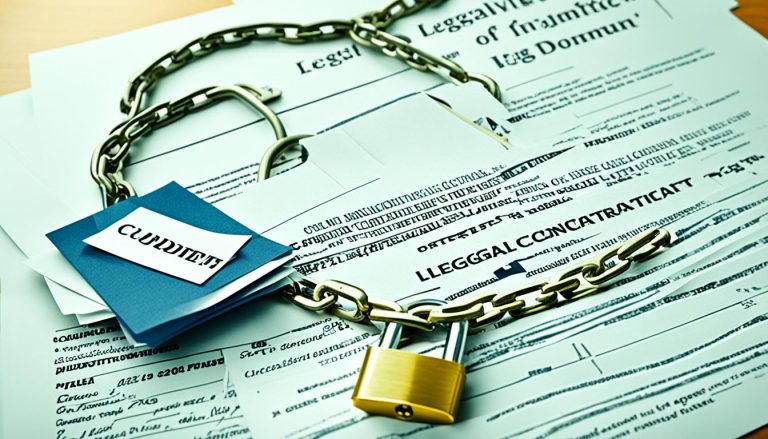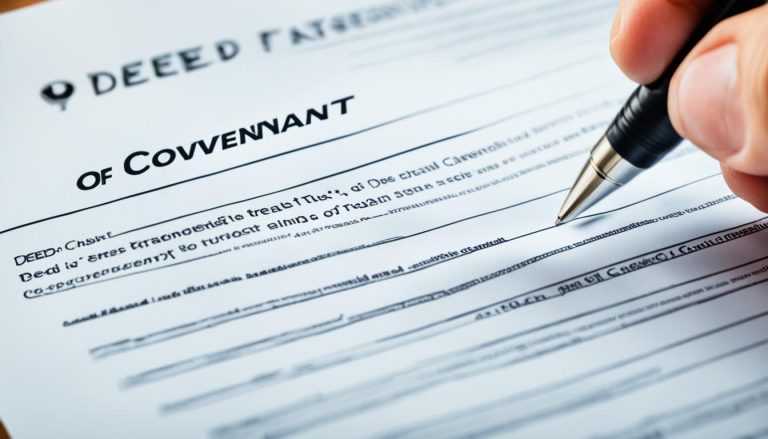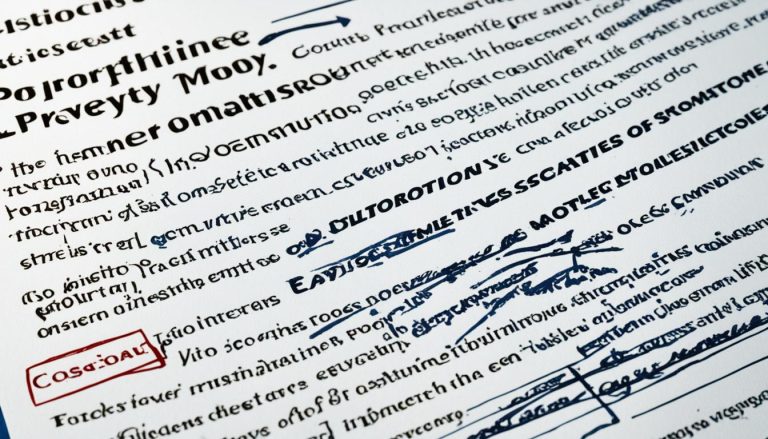Did you know over 85% of UK properties have restrictive covenants? These can limit your land’s use or development. It’s vital to know how to deal with them as a property owner or buyer. We will dive deep into how to find covenants on your property. This includes checking the Land Registry and examining title deeds. With this knowledge, you can wisely handle your property investments.
Understanding Restrictive Covenants
In the property world, restrictive covenants are very important. They define what a landowner can or cannot do with their piece of land. These covenants are like agreements between the land’s owner and someone else, often the buyer. They set specific rules on how the land can be used and developed.
What is a Restrictive Covenant?
A restrictive covenant stops the landowner from doing certain things on their land. They’re usually added when land is sold. The seller does this to keep the area looking a certain way. These rules might stop certain building projects, putting up satellite dishes, or having pets.
The Power of Restrictive Covenants
Enforcing a restrictive covenant is powerful. If a landowner breaks these rules, legal action can be taken against them. This keeps the restrictions valid, even if the land changes owners. Such rules often aim to keep the area nice and save on extra maintenance costs.
These covenants have big legal effects on landowners. It’s key to know what these are for and how they’re controlled. Learning about restrictive covenants helps landowners make smart choices. They can understand their land better and deal with property ownership issues more confidently.

Checking if Your Property has Restrictive Covenants
It’s key to know if your property has any restrictive covenants when you buy it. These rules can limit what you do with your property. To find them, check the property’s registration and look into the title deeds.
Registered vs Unregistered Land
How you check for covenants depends on if the land is registered. Most UK lands are now registered. This lets you get copies of the deeds easily. If the land is unregistered, it’s harder. The title deeds may be with the mortgage company or past owners.
Obtaining Title Deeds and Property Records
No matter the registration, you must look at the title deeds. Finding covenants in deeds is tricky. Their rules are complex too. It’s best to ask a legal pro to help you.
| Registered Land | Unregistered Land |
|---|---|
|
|

Know the difference between registered and unregistered lands. Carefully check the title deeds. This ensures you know about any covenants. This helps you plan better for your property’s future.
How to Find Covenants on Property UK?
Looking for restrictive covenants on a property in the UK might seem hard. But with the right steps, it’s actually quite doable. To start understanding how to find covenants on property UK, check the land registry records.
Searching Land Registry Records
If your property is listed with the Land Registry, you’re in luck. You can look up their files to see if there are any restrictive covenants affecting your land. This means getting your hands on copies of the title deeds and any other documents. The Land Registry website offers tips on how to do this. Currently, each document costs £3.00.
Reviewing Title Deeds and Filed Documents
After you get the title deeds, it’s important to check them properly. You aim to spot any restrictive covenants that might exist. These agreements can be hidden in the documents, and their wording can be hard to understand. It might take some work, but it’s key to finding out about any restrictions on property UK.
By carrying out these steps, you can uncover the covenants on property UK. This will give you a full picture of the limits and duties tied to your land. Knowing this is very important when you’re dealing with the conveyancing process. It helps you to wisely plan your property’s future.

Dealing with Restrictive Covenants
Handling restrictive covenants can seem tough for property owners in the UK. But, there are ways to tackle these issues. By knowing the process and getting legal advice, you can make things work in your favour.
Negotiating Covenant Removal
When dealing with covenants, start by talking to the party benefiting from it. This is usually the first owner of the land or someone who bought it. You need to get their agreement to change or remove the covenant. They might ask for a fee. It’s key to be polite and see things from their side to find an agreement that suits both.
Challenging Covenants Legally
If talks don’t work, you might have to fight the covenant in court. You can apply to the Lands Chamber of the Upper Tribunal to get it changed or ended. This route can be slow. And if you lose, you might have to pay the other side’s legal costs. But sometimes, especially if the covenant is unfair, this step is needed.
It’s wise to get expert legal advice when facing these issues. The process is complicated, and breaking a covenant can lead to big problems. A professional conveyancing solicitor or property law expert can give the best advice. They can help you find the right approach to deal with the covenants on your property successfully.

Selling a Property with Restrictive Covenants
If a property has restrictive covenants, it’s key to let buyers know. These rules affect the home no matter who owns it. If you broke a rule before, you may need to do more to help the next owners.
Consider getting a restrictive covenant indemnity insurance policy. It covers you if a rule is enforced, and you can transfer it to the new owners. This makes the selling process easier for everyone involved.
Working with a property law solicitor is crucial. They help make sure you deal with the covenants correctly. They offer expert legal property advice and help when selling property with restrictive covenants.
Being honest about covenants and dealing with them upfront helps sell your home. This provides buyers with clear information for their choice. It improves your chances of a successful sale.

Conclusion
Understanding how to deal with property covenants in the UK is vital. These rules can affect how you use or change the land. It’s important to know about them, even if your property is not yet on the registry.
To deal with covenants, you should check the Land Registry and your title deeds. You might need to talk to a lawyer for help or to challenge the rules. This can all be tricky, so getting legal advice is a smart move, especially if you’re selling property.
By using the tips in this guide, you can handle restrictive covenants well. Always keep in mind the conclusion, summary, and key takeaways on finding covenants on property uk. They’re key to a smooth property experience.
FAQ
How do restrictive covenants work?
They stick around with the land forever. Even if the land changes owners, these rules stay. Imagine rules that stop you from building different things, having pets, or putting up satellite dishes.
How can I find out if my property has restrictive covenants?
If your place is listed at the Land Registry, you can ask for the deeds and papers. They will tell you if any restrictive covenants apply. For unlisted properties, check with the mortgage company or the last owner for the deeds.
How do I search Land Registry records for restrictive covenants?
To look into the Land Registry’s documents, you need to get the title deeds and records. The Land Registry website shows how to do this. Each copy costs £3.00.
What can I do if my property is subject to restrictive covenants?
If you want to change a covenant, talk to whoever benefits from it or try a legal challenge. Both ways are tough and might need help from a lawyer.





